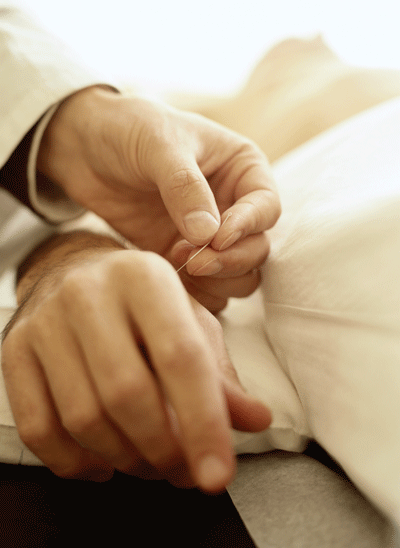Acupuncture may help alleviate dry eye symptoms, according to research reported at the Association for Research in Vision and Ophthalmology meeting.1
The double-masked study included 12 dry eye patients randomized to receive either acupuncture or sham acupuncture treatment. The acupuncture treatment involved placing needles at points according to protocol. Sham acupuncture involved placing needles in points on the shoulder known not to have treatment effects.
 |
|
Dry eye patients who underwent acupuncture had a significant improvement in fluorescein tear break-up time and rose bengal scores. |
Patients were evaluated at baseline and day one, one week and one month after treatment. The acupuncture group reported significant improvements in their symptoms on a questionnaire from baseline to one month post-treatment. The sham group reported a minor worsening of symptoms.
Schirmers tests showed minor but insignificant changes in the acupuncture group. However, patients in the acupuncture group had a significant improvement in fluorescein tear break-up timeincreasing from 6.6 seconds at baseline to 3.7 seconds at one month. In the sham group, fluorescein tear break-up time remained close to the baseline level. Also, rose bengal scores improved significantly in patients who received acupuncture.
There have been reports of acu-puncture benefiting patients who have xerostomia, or dry mouth, presumably through parasympathetic activation, says Brian Chou, O.D., of San Diego, Calif. The current study is a logical extension of these findings.
However, a recent meta-analysis found no evidence for the efficacy of acupuncture in the management of xerostomia,2 Dr. Chou says. Therefore, initial positive reports require validation, preferably through large-scale, randomized controlled trials.
Meanwhile, acupuncture should not supplant established treatments for keratitis sicca, he adds. However, acupuncture may be a reasonable alternative for refractory cases or may be adjunctive to established therapy.
1. Pham NH, Niemtzow RC, Bower KS, Burns S. Acupuncture treatment of dry eye. Poster presented at the Association for Research in Vision and Ophthalmology 2006 meeting. Abstract 258/B436. Presented April 30, 2006.
2. Jedel E. Acupuncture in xerostomia a systematic review. J Oral Rehabil 2005 Jun;32(6):392-6.

